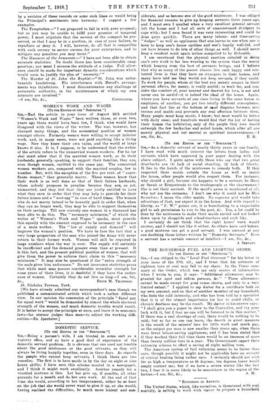DOMESTIC SERVICE.
ITo THE EDITOR OF THE " SPECTATOR:1 Sue.,—Being a parson's wife, I am -treated in some sort as a registry office, and so have a good deal of experience of the domestic servant problem. It is obvious that one need not trouble about the good mistresses or the good servants, as they will always be living happily together, even in these days. As regards the people who cannot keep servants, I think there are two remedies. The first is to have maids in by the day on eight or nine hours shifts; I have seen this scheme mooted in a newspaper, and I think it might work excellently. Another remedy for a troubled mistress is this. Let her give up, if possible, all other pursuits •for a month and do her own work. At the end of that time she would, according to her temperament, either be so keen on the job that she would never want to give it up, or she would, having realised the difficulties, be much more lenient and con-
siderate, and so become one of the good mistresses. I was obliged for financial reasons to give up keeping servants three years ago, and I must own I quailed when a very excellent general servant left the hone and I had all sorts of unaoeustomed drudgery to cope with; but I soon found it was very-interesting and could be done quite quickly. There are many labour- and time-saving "dodges " as well as appliances that one learns to use when one is keen to keep one's house spotless and one's family well-fed, and yet have leisure to do lots of other things as well. I should never keep a resident maid again unless compelled to by ill-health.
I am convinced that the physical exertion entailed in doing one's own work is far less wearing to the system than the worry which keeping even the best of servants brings, and I believe that why so many of the poorer classes live such happy and con- tented lives is that they have no strangers in their homes, and many have told me they would not keep servants if they could. To work for people, whom at the best you merely respect in their personal affairs, for money, is really sordid; to work for, and con- sider the comfort of, your nearest and dearest for love, is not and never can be sordid—it is indeed the ideal of the home. Again, where you have servants of one class living in the same house as employers of another, you get two totally different atmospheres, and that fact lies at the bottom of most disputes between mis- tresses and maids and prevents any real affection between them. Many people must keep maids, I know; but most would be better with daily ones; and hundreds would find that the joy of having their homes the habitation, only of the people they love would outweigh the few backaches and soiled hands, which after all are merely physical and not mental or spiritual inconveniences.—1


























 Previous page
Previous page